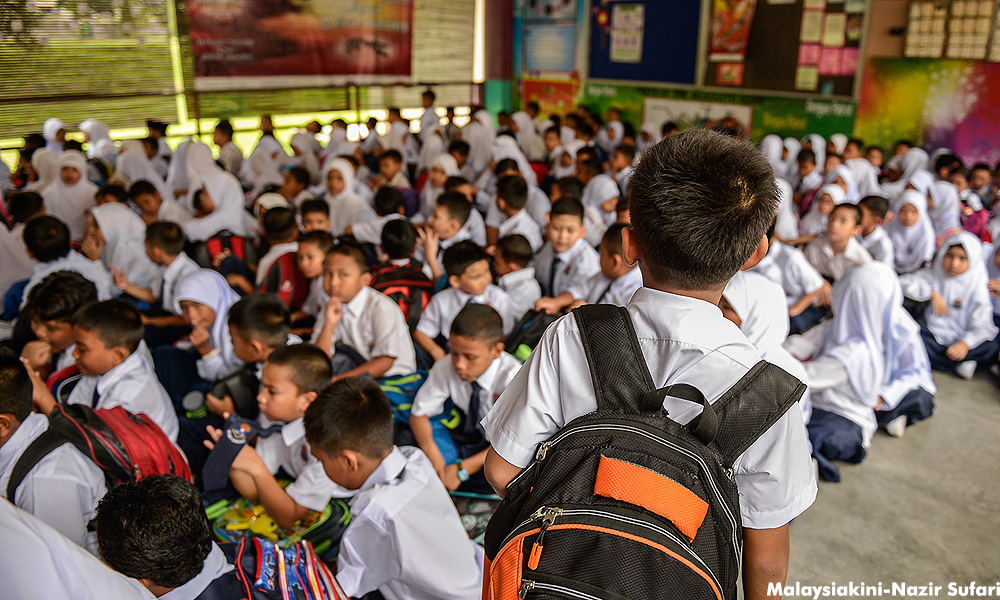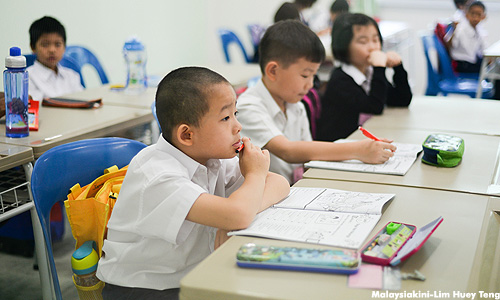
The outcry over the disclosure that 402 schools in the country have been classified as “hotspots” with disciplinary and drug issues is yet another distraction from what should be the major priority of our politicians and bureaucrats managing the education system - that is, implementing deep reform of the national primary and secondary school system, especially beginning with the national schools of the Bahasa Malaysia or Malay medium, and predominantly bumiputera-attended stream (Sekolah Kebangsaan and Sekolah Menengah Kebangsaan, SK and SMK).
Although the furore, when set against the larger and more important backdrop of the overall sorry state of the national schooling system, is misplaced, what is revealing is that almost all the problematic schools (396) found in the blacklist come from the SMK stream against six from the Sekolah Menengah JenisKebangsaan (SMJK) stream.
This is yet another clear indication of the appalling mess left by zealots pushing the racial and religious agenda in our educational system.
The main victim of this mess is a lost generation of Malay and bumiputera school kids who paradoxically, despite being overwhelmingly favoured in resource allocation in the national system during the past 40 years, have ended up with low attainment levels and are also generally lacking in the important outcomes that the educational system is supposed to be imparting - knowledge, skills, strong ethics and the drive to succeed.
The critical problems affecting schools in the SK stream have been known for a long time. But they have been ignored or left unresolved by the Barisan Nasional government and the Ministry of Education, with little attempt made at comprehensive reform until the last few years.
Repeated complaints have been raised about the quality of these schools, including their low teaching standard, the obsession with single-race dominance and management, the narrowly nationalistic, rote learning-oriented and behind-the-times curricula, increasing Islamisation, poor leadership, disciplinary issues (which are now the subject of public attention) and a host of other shortcomings, but to little avail.
The inaction by the authorities has resulted in non-Malay parents shunning these schools and sending their children to the SJK or mother tongue stream, and English language private schools, if they are able to afford it.
'Vernacular education as a scapegoat'
At the same time - diverting attention away from the failure of the politically-favoured SK stream to provide quality and progressive education for all young Malaysians - was a hostile and virulent campaign accusing mother tongue or vernacular schools (SRJK and SMJK stream) of being responsible for dividing the young of the different races and being the cause for the lack of national unity in the country.
The campaign, although unable to produce any evidence to support its claims, succeeded all too well in muddying the waters of educational reform discourse in the country during the last two decades.
 Today, only a few hardliners are still clamouring for the closure of SRJKs. It is clear that their ill-founded politically driven campaign to close down Chinese and Tamil medium SRJKs has ground to a halt.
Today, only a few hardliners are still clamouring for the closure of SRJKs. It is clear that their ill-founded politically driven campaign to close down Chinese and Tamil medium SRJKs has ground to a halt.
The final blow to this campaign, ironically, has come from middle and upper-class Malay parents who have enrolled their children in increasing numbers in Chinese language medium schools because of the perceived higher standard of teaching and discipline in these schools and the loss of faith in the quality and performance of the Bahasa Malaysia stream.
At last count, the enrolment of non-Chinese students in the SJKCs (Chinese medium schools) could be as high as 20 percent of the total enrollment of more than 500,000 students in this stream. It is possible that if SJKCs are not discriminated against and are provided with equitable resources to grow, we may have a majority of Malay and bumiputera parents preferring to send their children to this stream instead of SK schools.
Why have so many parents - Malays and non-Malays, given up sending their children to SK schools? What are the deeper and more serious problems and shortcomings that afflict these schools, besides that of bullying, gangsterism, smoking, drugs and other behavioural related issues that hog the headlines to divert our minds away from focusing on more critical reform concerns?
The answers are not difficult to arrive at. But throwing more money into these schools is not the solution. According to one estimate, SK schools during the 6th to 9th Malaysia Plans (1991-2010) received from five to 10 times more public funding on a per capita basis compared with SJK schools.
Per capita expenditure allocations during the four Malaysia Plans amounted to RM614, RM483, RM2,131 and RM2,000 for SK primary schools compared with RM176, RM44, RM217 and RM274 for the Chinese medium primary schools, with Tamil medium schools slightly less disadvantaged than their Chinese counterparts.
Logically, we should expect that this skewed expenditure over the prolonged period of the NEP (and until today) should have produced a higher quality of educational performance across the board in the SK stream, in its principals, teachers and other school leaders, and in the performance outcomes of its student population. This has not happened.
In October 2011, the Ministry of Education embarked on a comprehensive review of the education system to develop a new National Education Blueprint. In the blueprint report, which emerged in 2013, it was pointed out that Malaysia may not be getting the highest return on educational investment. The report also noted that the best available data on unity suggest that student and teacher diversity in SKs is decreasing and called for a renewed commitment to ensuring that the nation's funds are efficiently used.
It also concluded that “it is important to understand what drives these outcomes so that the Malaysian educational system can scale up its successes, and reduce, if not eliminate, its areas of a shortfall.” (Chapter 3-28). Unfortunately, the blueprint, in attempting to be politically correct, failed to provide a blunt, in-depth and critical analysis of why SK schools have failed.
Why have SKs failed to perform and what policy changes are needed to bring about real - and not cosmetic improvements need to be put on the national agenda priority, and not the ones put out that are generating “sound and fury” and likely to signify little or nothing.
Malaysian parents and their children, especially those enrolled in the SK stream, as well as the country as a whole, deserve better than the present Education Ministry-initiated hullabaloo over schools with disciplinary issues.
LIM TECK GHEE is a retired academician and currently public policy analyst. - Mkini



No comments:
Post a Comment
Note: Only a member of this blog may post a comment.